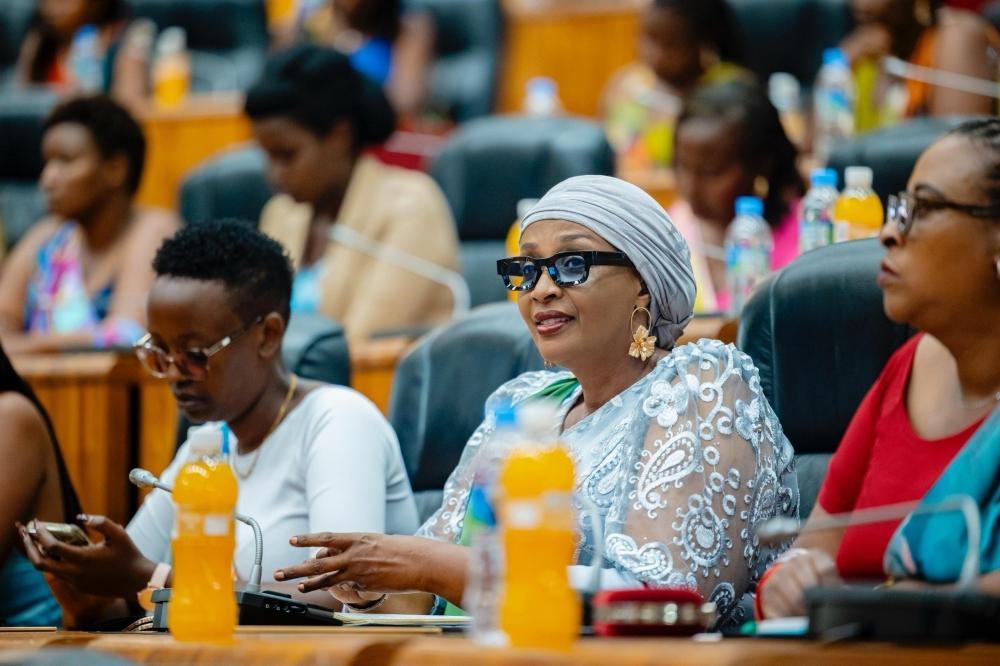Africa-Press – Rwanda. Poor parenting has been identified as a leading cause of many challenges facing Rwandan families today, accelerating a cycle in which children raised in unstable households risk becoming irresponsible parents and citizens themselves.
The Ministry of Gender and Family Promotion (MIGEPROF) raised the concern on Friday, September 19, during the 24th National Women’s Forum, which discussed a range of issues concerning women, including their role in fostering strong families and contributing positively to national development.
Officials emphasized the need for parents to embrace positive parenting, stressing that its absence continues to fuel persistent difficulties that undermine the strength of families.
While addressing the delegates on the state of Rwandan traditional families, Mireille Batamuriza, the Permanent Secretary at MIGEPROF, highlighted both achievements and challenges. She praised progress in gender equality, social welfare, women’s empowerment, reduced maternal mortality rates, and increased education for girls, while noting that many persisting family issues still stem from poor parenting.
“Problems such as street children, teenage pregnancies, child labor, drug abuse, and domestic violence are often linked, directly or indirectly, to inadequate parenting,” Batamuriza said.
She emphasized the central role of families in a well-functioning society, noting that a healthy family rests on three pillars, namely good governance, social welfare, and economic development.
“These pillars reinforce each other and the absence of one weakens the others. Children are the most vulnerable when the family structure is weak, and this vulnerability often fuels a cycle of problems. And many of these issues trace back to poor parenting. Without proper guidance and support, children are more likely to take the wrong path in life,” Batamuriza added.
Chaste Uwihoreye, a clinical psychologist, urged parents to prioritize their mental health and address past traumas, emphasizing that healing themselves is essential to effectively guide and nurture their children.
He explained that parents who confront personal challenges are better equipped to provide a stable, loving, and positive environment, which is the foundation of responsible and effective parenting.
He compared the family to a human body, where each part supports the other, and any weakness in one part affects the whole.
“Just as the body can be weakened by viruses, a family can be undermined by harmful influences,” Uwihoreye said. “Lack of communication, unresolved traumas, domestic conflicts, misunderstandings about gender roles, and violence are all ‘viruses’ that can destabilize the family system if left unchecked.”
He emphasized that, regardless of the challenges or the stage of a family’s struggles, the family can recover and heal through shared commitment and concerted effort. Uwihoreye also noted that just as the body requires proper nourishment to stay healthy, a family too needs care and attention to thrive.
“The family thrives on open communication, trust, respect, and a sense of safety, where members feel valued and enjoy being together more than anywhere else,” Uwihoreye said.
He identified warning signs of a struggling family system, including frequent conflicts, poor interaction among members, children leaving home or ending up on the streets, separation within the household, and even divorce.
Challenges continue to affect traditional families, with conflicts sometimes escalating to tragic outcomes, including murder. Over the past six years, statistics show 395 cases of spousal homicide involving 457 individuals, according to Rwanda Investigation Bureau (RIB).
“Among the victims are 300 women and 95 men, highlighting that both genders are involved in these incidents. Many cases are linked to infidelity, property disputes, misunderstandings of gender equality, and drug abuse,” Consolee Kamarampaka, RIB Deputy Secretary General, said at the conference.
She stressed the urgent need for a coordinated, collective response. “These challenges demand a strong, united approach. Women, in particular, have a vital role to play in leading efforts to address and prevent such issues in our families.”
Mediatric Umubyeyi, the Executive Secretary of the National Women’s Council, emphasized that these issues should concern leaders at all levels, especially at the grassroots, to ensure families are safe and stable.
“It is not a Rwandan thing to use killing as a solution. Our country has endured the tragic history of the 1994 Genocide against the Tutsi, the effects of which may still linger in some people,” she said.
“There is no justification for a child killing a parent, a husband killing a wife, or a wife killing a husband. Consistent and sustained efforts are needed to teach people at all levels that one mistake cannot be corrected with another. Families must learn to address their issues through dialogue before they escalate to such tragic consequences.”
For More News And Analysis About Rwanda Follow Africa-Press






